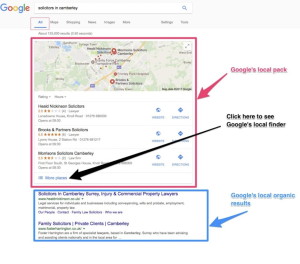Local SEO is everything you didn’t know your business needed.
When it comes to optimizing your website to reach potential customers, sometimes casting the widest net available is not always the best option. Sure, you want to direct traffic to your site in hopes of acquiring new, paying customers. So why wouldn’t you want to reach the most people possible? Because as my favorite marketing saying goes: If you’re marketing to everyone, you’re marketing to no one. Fishermen don’t go out in the morning looking to catch every type of fish in the sea, and neither should you.
So how do you reach the RIGHT people? The people that are more likely to engage with your business? The answer to this is Local SEO, and it is crucial for any business that wants to stay competitive in today’s market.
Local SEO vs National SEO
We’ve all heard of SEO. We all know as small businesses that we need to optimize our websites in order to drive traffic from search engines. But not all SEO is created equal.
National SEO (sometimes referred to as traditional SEO, organic SEO, on-site SEO, on page SEO or global SEO) focuses heavily on keywords, with the goal of driving traffic to your website on a global scale. When someone makes a search online, search engines scan websites for all sorts of content – keywords, images, videos, inbound and outbound links, site speed, etc. – to determine which websites have content that they think users will want to see. If your website is deemed valuable to the algorithm gods, it increases your domain authority and you’re a lot more likely to show up higher on SERPs (search engine results pages).
Local SEO, on the other hand, focuses on increasing your search engine visibility in local markets and geographic areas, a critical opportunity for local businesses. If you have a local business, like a shop, restaurant, or even a service-based business, you want your web pages to rank for certain search queries performed by a local audience, as they’re the ones most likely to purchase from you. We’ve all searched for things like “new restaurants near me” and seen the results that pop-up.
Local SEO helps your business appear in the “local pack” and “map pack” of search results. This can be incredibly beneficial, as many people are more likely to choose a business that is located near them. In fact, 92% of searchers will pick businesses on the first page of local search results. Those “local pack” search results are actually shown above the national/organic SEO results, which you can see in this example.

Benefits of Local SEO
As we’ve already mentioned, if you’re marketing to everyone, you’re marketing to no one. This is where the largest benefit of Local SEO truly lies. 43% of all Google searches are location oriented and about 50% of mobile searches have a local intent, meaning there is a TON of opportunity with Local SEO.
Some of the other benefits include:
- Ranking in your local market is often significantly less competitive than ranking on a national scale (especially since many small businesses don’t optimize for local search!)
- It allows you to attract customers who are specifically searching for the products or services you are offering with geographically-specific long tail keywords
- It typically takes less time and effort to rank locally
- Receiving relevant traffic will help your on-site SEO in the long-run
- Significant opportunities to increase brand awareness and trust
- Paid advertising is much more affordable on a local level
Local SEO tips
Now that we’ve covered all the reasons WHY you want to leverage Local SEO for your business, let’s get down to the nitty gritty of HOW you can get the most out of Local SEO. Here are four key elements that you can easily take advantage of.
Optimize and leverage your Google Business profile
While National SEO relies on the content on your website, Local SEO relies heavily on everything else, and your greatest friend in Local SEO is your Google Business Profile. Start by getting your profile setup and verified. Utilize Google Posts to share routine updates from your account with existing and potential customers. Make sure your hours and contact information is always up to date. Encourage customers to leave reviews online and appropriately respond to all reviews you receive. All of these steps let Google know that your business is authentic, making them that much more likely to grant you some coveted local search sidebar space.
Ensure your NAP is consistent across your online presence
In order for Local SEO to be effective, we need to know where you’re located. Your NAP (name, address, and phone number) make it easier for people and search engines to find you. It should be consistent and readable across your website (usually in a footer or Contact page), Google Business Profile, social media and anywhere you show up online.
Optimize your website for local search
Even though Local SEO focuses less on your website content than National SEO does, your website still plays a huge role in your local search success. First and foremost, optimize your website for local search by ensuring that your site is mobile friendly. “Near me” searches on mobile have increased by more than 250% over the last few years. Optimize URLs, title tags, headers and meta descriptions with geographic search phrases (i.e., Marshfield Marketing Agency). And of course, ensure your NAP is easy to find and accurate.
Optimize online directories and citations
Building citations can also help improve your visibility in search results and make it easier for customers to find your business. This can be achieved by getting listed in online directories such as Google My Business, Yelp, Massachusetts Business Network, and Yellow Pages. Consistency is key, so verify that your listings are consistent and accurate across all search engines.
Remember that SEO is a long game, not a short one, and that goes for Local SEO as well. It can seem tempting to take your foot off the gas once you get everything set up and optimized for where you want it to be. However, the internet is an ever-evolving place. Consumer behaviors, competitors, and algorithms are ALWAYS changing. Set aside time to routinely audit how your SEO is performing and analyze how it is contributing to your marketing goals. Or work with a local digital marketing team like Anchor Watch Marketing that can regularly analyze and assess how Local SEO can help your business grow by reaching the right customers.
This is a contributed piece published by Jessica Ponyrko of Anchor Watch Marketing, which she started after getting burnt out from years of working in corporate as a sales training specialist and brand launch manager and realizing she could take those same skills and use them to help small business owners in her own community. Jess and her team specialize in brand strategy, website design, and management and consulting, helping her clients to not only create memorable brands and spectacular websites, but to find a balance of their own.
Interested in submitting a contributed piece? Fill out our contact form.

Leave a Reply